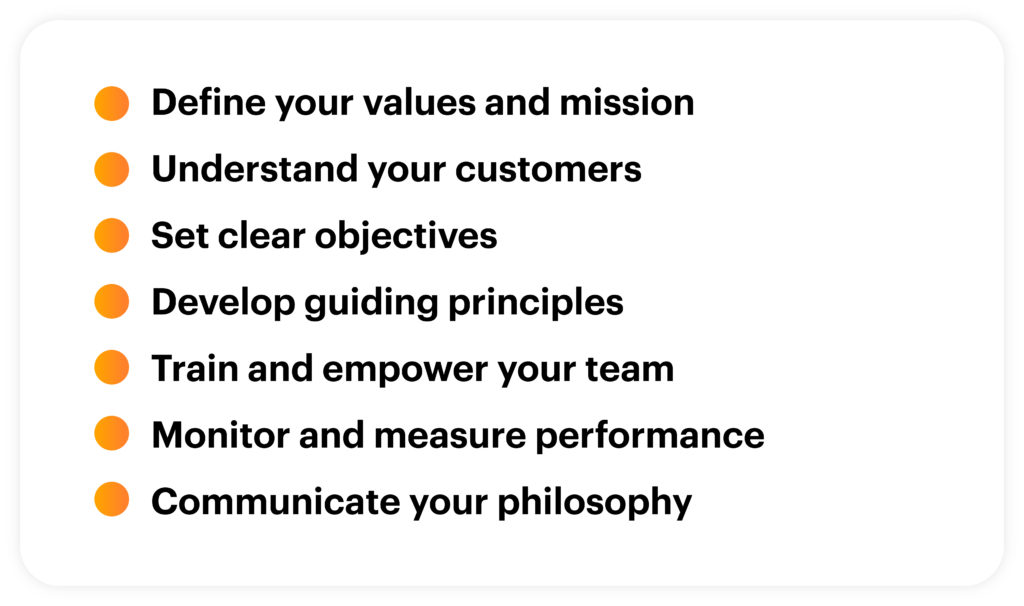In today’s competitive business landscape, providing exceptional customer service is a critical aspect of building brand loyalty and standing out from the competition. A customer service philosophy can be a driving force behind consistently delivering great service experiences to customers. In this article, we’ll discuss what a customer service philosophy is, why it’s important for B2B companies, and how you can create one tailored to your organization.
What is a Customer Service Philosophy?
A customer service philosophy is a guiding principle that shapes the way an organization approaches customer service and support. It encompasses the organization’s core values, vision, and mission, and serves as a foundation for creating a customer-centric culture. By having a well-defined customer service philosophy, B2B companies can ensure that their customer support teams consistently deliver excellent service experiences, which in turn helps to build long-lasting relationships with clients and drive business growth.
The Importance of a Customer Service Philosophy in B2B Companies

In B2B organizations with high annual contract values (ACVs), the importance of a customer service philosophy cannot be overstated. Here’s why:
- High customer expectations: B2B customers often have more complex needs and higher expectations than B2C customers. A customer service philosophy helps ensure that your support team is equipped to meet these expectations and deliver consistent, high-quality service.
- Relationship building: In B2B settings, long-term relationships with clients are crucial for sustained growth. A customer service philosophy fosters a culture of exceptional support, which can strengthen these relationships and increase customer retention.
- Differentiation: With numerous competitors vying for the same clients, a standout customer service philosophy can be a key differentiator that sets your organization apart.
- Revenue growth: As mentioned earlier, 75% of customers are willing to spend more on a brand that provides a positive experience. A strong customer service philosophy can lead to increased customer satisfaction and, ultimately, higher revenues.
Steps to Create a Customer Service Philosophy for Your B2B Company

Creating a customer service philosophy involves understanding your organization’s values, goals, and the needs of your clients. Here’s a step-by-step guide to help you develop your own:
- Define your organization’s values and mission: Begin by clearly outlining your company’s core values and mission statement. This will serve as the foundation for your customer service philosophy.
- Understand your customers: Research your target audience and identify their needs, preferences, and expectations. This information will help you tailor your customer service philosophy to best serve your clients.
- Set clear objectives: Establish specific goals for your customer service team. These objectives should align with your company’s mission and values and should be measurable and attainable.
- Develop guiding principles: Create a set of guiding principles that your customer service team can use as a roadmap for delivering exceptional service. These principles should be based on your company’s values, mission, and customer insights.
- Train and empower your team: Ensure your customer service team has the necessary training and resources to put your customer service philosophy into action. Empower them to make decisions and take ownership of their interactions with customers.
- Monitor and measure performance: Regularly track and evaluate your customer service team’s performance against the objectives you’ve set. Use these insights to identify areas for improvement and refine your customer service philosophy as needed.
- Communicate your philosophy: Share your customer service philosophy with your entire organization to foster a customer-centric culture. Encourage all employees, not just your customer service team, to embody your philosophy in their daily interactions with clients.
Example of a B2B Customer Service Philosophy
Let’s take a look at an example of a customer service philosophy for a B2B company using the principles discussed earlier:
At Supportbench our customer service philosophy is built on three core principles: proactive support, personalized solutions, and continuous improvement. We believe that these principles enable us to consistently deliver exceptional customer experiences that strengthen our client relationships and drive our mutual success.
Proactive Support: We strive to anticipate our clients’ needs and address potential issues before they become problems. By staying one step ahead, we can minimize disruptions and ensure our clients’ operations run smoothly.
Personalized Solutions: We understand that each client is unique, and we are committed to providing tailored support that meets their specific needs. Our customer service team takes the time to listen and understand our clients’ challenges and goals, allowing us to deliver customized solutions that drive results.
Continuous Improvement: We believe that there is always room for growth, and we are dedicated to constantly refining our processes and elevating our service levels. Through regular performance evaluations, feedback, and data-driven insights, we strive to exceed our clients’ expectations and maintain our reputation as a trusted partner in their success.
By incorporating these principles into our daily operations, we aim to create a customer-centric culture that sets Supportbench apart from our competitors and fosters long-lasting, mutually beneficial relationships with our clients.
Summary
In today’s highly competitive B2B landscape, having a well-defined customer service philosophy is essential for businesses looking to differentiate themselves and build lasting relationships with their clients. By focusing on proactive support, personalized solutions, and continuous improvement, companies can create a customer service philosophy that drives exceptional experiences and promotes sustained growth.
Remember, consistently providing great customer service is not just about having a great product or service—it’s about fostering a customer-centric culture that puts the needs and expectations of your clients at the forefront. Develop your customer service philosophy today and set your B2B organization on a path to long-term success.












